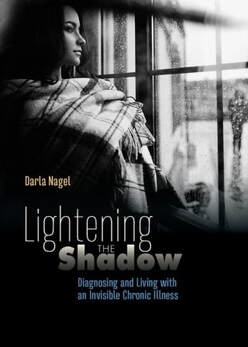|
What inspired this book? I asked myself, "What might have happened if my sister-in-law and brother had accepted my offer to be a surrogate for them?" So yes, this narrative is personal to me and is inspired by, though not based on, a real couple’s experience with infertility and cancer. Second, I think it's ridiculous that surrogacy is illegal in Michigan and want to support its legalization. Third, I have been curious about pregnancy and the first stages of life from a young age, and "giving birth to" a book rather than a baby is within my abilities and comfort zone. The Sisterhood of Motherhood is for women who are interested in surrogacy and for people who believe love can overcome family problems and believe that infertility isn’t the end but rather the beginning. Darla Nagel is a biomedical copy editor who has an invisible chronic illness. She wants to educate healthcare professionals and encourage patients. If you want to receive quarterly updates from her, email darla.nagel{a}gmail.com.
0 Comments
I explore the emotions of surrogacy and family building in my novella, The Sisterhood of Motherhood, now available in ebook format from online booksellers. As the protagonist, Bethany, steps up to be a gestational surrogate for her sister-in-law amid infertility and cancer, she steps beyond her comfort zone. Navigating medical and legal challenges, shifting family dynamics, and doubts about her motives, Bethany’s surrogacy becomes an exercise in resilience, sacrifice, and the unbreakable bonds of sisterhood. The Sisterhood of Motherhood reminds readers of the strength that grows from women supporting women. What made me write this book? I wanted to show that surrogacy is a solution for infertility but not the perfect solution for every family. Be the first to hold this baby, I mean, book. Darla Nagel is a biomedical copy editor who has an invisible chronic illness. She wants to educate healthcare professionals and encourage patients. If you want to receive quarterly updates from her, email darla.nagel{a}gmail.com.
Many couples decide adoption is not what they desire or can afford. But what if there were a way to adopt and still experience pregnancy and newborn care, plus save an innocent life from destruction? There is: embryo adoption. In vitro fertilization (IVF) can generate more embryos than a couple is willing to carry. We’re up to over a million tiny babies on ice. Organizations work to match couples who are willing to adopt other couples’ embryos. It’s a beautiful solution, one worth promoting. It’s a solution I’ll mention in my upcoming novel. It’s a solution I pray God blesses. Darla Nagel is a biomedical copy editor who has an invisible chronic illness. She wants to educate healthcare professionals and encourage patients. If you want to receive quarterly updates from her, email darla[dot]nagel[a]gmail.com.
The Friday before Mother’s Day 14 years ago, I felt like I was coming down with something. A week later, as I wrote in my book: I don’t feel tired; I feel stunned on the ground from body slamming a brick wall. I feel fifty years older. I feel unplugged in the dark. That’s how I felt while combing my hair in the YMCA locker room after one of my hour-long swims. What I actually thought was Maybe this is more than a cold. I’m whipped, and my legs are sore, even though I didn’t swim as hard today. Usually, swimming made me feel calm and strong, without causing sweating, even after the two-hour practices I’d done on my high school swim team….But I’d had this cold, which was mild except for utter exhaustion that made me not want to do anything involving physical or cognitive effort…. I didn’t learn my diagnosis until two years and five months had passed and my condition had worsened. Two years represented a tenth of my life. Falling ill at age nineteen was like having my wings chopped off just as I was taking flight. Maybe the timing would’ve been worse if they had been chopped when I was hundreds of feet in the air, a year into a career in a city far from my parents. But I would’ve liked to soar through the air. If that sounds like the start of a story about long COVID, you’re partially right. Long COVID and ME/CFS have much in common, chiefly, an overwhelming and flawed bodily response to a virus. ME/CFS is just as real and just as detrimental. Even after 14 years, some people don’t know what ME/CFS is and don’t know that I’ve written a book that is meant to help young people living with any invisible chronic illness. Don’t spend another 14 years in the dark. Read my book for a personal lesson, or see the Resources section for online information. Darla Nagel is a biomedical copy editor who has an invisible chronic illness. She wants to help other patients and enlighten health care professionals about our experiences. If you’d like to receive quarterly updates from her, sign up by emailing darla.nagel {a} gmail.com.
I used to think inability to reproduce naturally didn’t constitute a physical disability. Now I think infertility is a physical and emotional disability for both husband and wife. It carries a high emotional and financial toll with so many uncontrollable factors. I never thought IVF would take place in my Christian family, but now it has, with all of its hurdles and doctors and needles. The couple within my family is now at the second-to-last hurdle: a “lining check” to see whether embryo implantation should be attempted. I am praying for the best outcome for this couple and their “snowflake babies.” Join me in this prayer and in appreciation of the gift of life from our Creator. Darla Nagel is a biomedical copy editor who has an invisible chronic illness. She wants to educate healthcare professionals and encourage patients. If you want to receive quarterly updates from her, email darla{dot}nagel{a}gmail.com.
I graduated from college 10 years ago and was so ill that the first thing I did upon arriving home was go to bed. In fact, that is the last memory I have of that month, other than receiving a diploma frame for Christmas. I was so broke—but free of student loan debt—that I had $100 in my checking account and a desperation to find work. I wondered whether I’d have any pleasant memories of college or only remember the drudgery. I’m much healthier, much wealthier, and much happier now. I’m asking what’s next for me. In the next five years, I intend to make four music videos, take three graduate-level courses in nutrition and the business of publishing, expand two pages on MEpedia, and write one book. My ambition is back, and my health is just about there. I’m not letting my education go to waste. I’m moving forward, yet I’ll keep a presence back here to support my readers. I want the best for your health and future, too! Darla Nagel is a biomedical copy editor who has an invisible chronic illness. She wants to educate healthcare professionals and encourage patients. If you want to receive quarterly updates from her, email darla.nagel{a}gmail.com.
For the first time, I edited subtitles on a company YouTube video to better reflect what the speaker and interviewer said. I've wanted to make my company's content more accessible for some time, and it was easy to learn how to use YouTube's subtitle editor tool. One video down, about 160 more to go. Some of the speakers are going to have heavy accents or discuss specific scientific terminology, meaning auto-generated subtitles won't be sufficient. I'm excited to make each subtitle accessible for people who prefer captioned videos. In the past month, I also educated a local publisher on what alt text is and is for. Alt text is not something my company is adding to content, but for companies with the human and technology resources to add it, alt text is another important accessibility action item. If my own website is missing some accessibility feature, please let me know in a comment! Darla Nagel is a biomedical copy editor who has an invisible chronic illness. She wants to educate healthcare professionals and encourage patients. If you want to receive quarterly updates from her, email darla.nagel{a}gmail.com.
I finally got to copyedit a research study on ME/CFS! Dr. Maureen Hanson and her team published a study on metabolism in patients with ME before and after two days of strenuous exercise in the journal I copyedit for, JCI Insight. Read it here. I’ll summarize what I took away from reading the article multiple times. Direct any questions to the article authors, not to me, because I am not a scientist or clinician. Glutamate and vitamin B3 metabolism differed between patients and healthy controls, but there was no evidence for overall hypometabolism. In female patients, the data showed a gradual altering of something called the plasma metabolome resulting from exercise stress. There may be less passing of electrons through mitochondrial membranes in patients. Overall, exercise recovery is impaired in patients. I am grateful for any research published on ME, and to my mind, the only positive result from the pandemic is the heightened interest in ME research because of the similarities between long COVID and ME. I look forward to my next opportunity to copyedit an ME study for JCI Insight. Darla Nagel is a biomedical copy editor who has an invisible chronic illness. She wants to educate healthcare professionals and encourage patients. If you want to receive quarterly updates from her, email darla.nagel{a}gmail.com.
Breath awareness, which is as simple as noting whether you’re breathing out or breathing in, is the foundation of yoga therapy, as I learned from interviewing yoga therapist and educator Veronica Zador. Read the interview published in Natural Awakenings here. Breathing is also the foundation of yoga and a requirement for mindfulness and for the heart/mind connection in health. I think breath awareness is the reason I feel strong and feel connected to my body when I swim and sing. You have to breathe to avoid drowning! You have to breathe to make vocal music audible and controlled. So, stop reading and clicking for 10 seconds, and notice whether you’re breathing in or breathing out. That’s your first step toward better health. Darla Nagel is a biomedical copy editor who has an invisible chronic illness. She wants to educate healthcare professionals and encourage patients. If you want to receive quarterly updates from her, email darla.nagel {a} gmail.com.
For too long, I've let pain affect my functioning. Whether that pain was from joints, muscles, or frequent sinus headaches, I can no longer let that pain get in my way when there are things I can do to reduce the pain. So, my New Year's resolution is to do what it takes to stop pain from holding me back. I don't have many specifics for modalities that I will try this year that I have not tried before, but I am open to new possibilities. I hope you will join me as well. No one deserves to live with chronic pain. I hope that this will be more successful than last year's resolution to greatly reduce my sugar and gluten intake! Darla Nagel is a biomedical copy editor who has an invisible chronic illness. She wants to educate healthcare professionals and encourage patients. If you want to receive quarterly updates from her, email darla.nagel{a}gmail.com.
|
Author:
|





 RSS Feed
RSS Feed